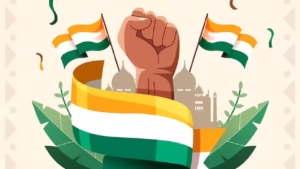
The Nationalism We Forgot: Reclaiming Constitutional Patriotism
Introduction: Why in News?
The article addresses the shifting nature of Indian nationalism in the wake of recent India–Pakistan tensions. It critiques how nationalism is being redefined to stifle dissent, compromise constitutional rights, and equate patriotism with allegiance to political authority. The author reflects on the degeneration of the inclusive and layered nationalism from India’s freedom struggle into an exclusionary, imitative form. This makes it an important topic under CLAT Current Affairs 2026 and for aspirants seeking clarity on legal-political interfaces.
Point-wise Summary
- Recent Trigger – India-Pakistan Conflict:
- The Ali Khan Mahmudabad case and subsequent discourse reflect a disturbing shift where courts and politics prioritize national interest over constitutionally guaranteed freedoms.
- Criticism of Imitative Nationalism:
- The article compares today’s hyper-nationalism with German, Israeli, and Pakistani models, arguing that India is emulating these without context.
- This is not a uniquely BJP phenomenon; it reflects a broader cultural and political regression.
- Subversion of Rule of Law:
- Freedom of expression and dissent are increasingly portrayed as anti-national.
- The court’s unwillingness to entertain such arguments signals a dangerous precedent.
- Historical Contrasts:
- Leaders like Jayaprakash Narayan, Ram Manohar Lohia, and Atal Bihari Vajpayee stood for the nation while openly criticizing the government (e.g., on the 1962 Indo-China War).
- Their dissent was seen as part of democratic accountability, not betrayal.
- Misuse of the ‘Anti-national’ Label:
- Any questioning of the government’s foreign policy, especially regarding Kashmir or China, is now branded as traitorous.
- Shift from Constitutional to Authoritarian Nationalism:
- Nationalism today has been appropriated as loyalty to the ruling party or leader.
- This centralization of national identity marginalizes minorities, dissenters, and federal voices.
- Forgotten Legacy of Inclusive Nationalism:
- Indian nationalism, during the freedom movement, united diverse languages, religions, castes, and ideologies.
- It was anti-colonial, anti-centralist, and democratic, rooted in solidarity, not suppression.
- Internal Inconsistencies and Hypocrisy:
- Governments are silent on foreign leaders contradicting India’s stance.
- Those who question this silence are interrogated, not those in power.
- Contradiction between Nationalism and Democracy:
- By equating criticism with sedition, the state is replacing citizen rights with blind allegiance.
- Warnings from Global Examples:
- The article references how nationalism, when misused, undermines internal unity, as seen in other regions.
Explanation of Key Terms (CLAT-friendly Notes)
- Nationalism:
- Devotion to one’s nation; historically in India, it was inclusive and rooted in anti-colonial resistance.
- Ali Khan Mahmudabad Case:
- Legal case highlighting how freedom of speech was undermined under the guise of national security.
- Copycat Nationalism:
- Imitative nationalism modeled on Israel, Pakistan, or Nazi-era Germany that focuses on ethnic/religious purity.
- Constitutional Patriotism:
- Loyalty to the nation through adherence to the Constitution, not to a political party or leader.
- Anti-national:
- A label increasingly used to discredit dissent and shield the state from democratic scrutiny.
Relevance to CLAT 2026 Aspirants
- Constitutional Provisions:
- Article 19(1)(a): Freedom of speech and expression
- Article 21: Right to life and dignity
- Article 32: Right to Constitutional Remedies
- Article 14: Equality before law
- Legal Reasoning:
- The conflict between national interest and citizen rights is a key area in CLAT’s Legal Aptitude.
- Political and Current Affairs Awareness:
- The issue of labeling critics as anti-national is part of broader debates on democratic accountability, judicial independence, and executive overreach.
- Essay and Interview Insights:
- Aspirants must understand the nuances of dissent in democracy and how legal systems can be manipulated under populist nationalism.
Conclusion: Towards a More Mature Nationalism
The article powerfully critiques how nationalism, once a unifying force during India’s freedom struggle, is now being used to divide, suppress, and silence. For CLAT aspirants, this is a critical lens to assess law, statecraft, and civil liberties. Understanding the tension between national pride and democratic accountability will enable future lawyers to uphold constitutional values in an increasingly polarized environment.







